Syed Haq no more
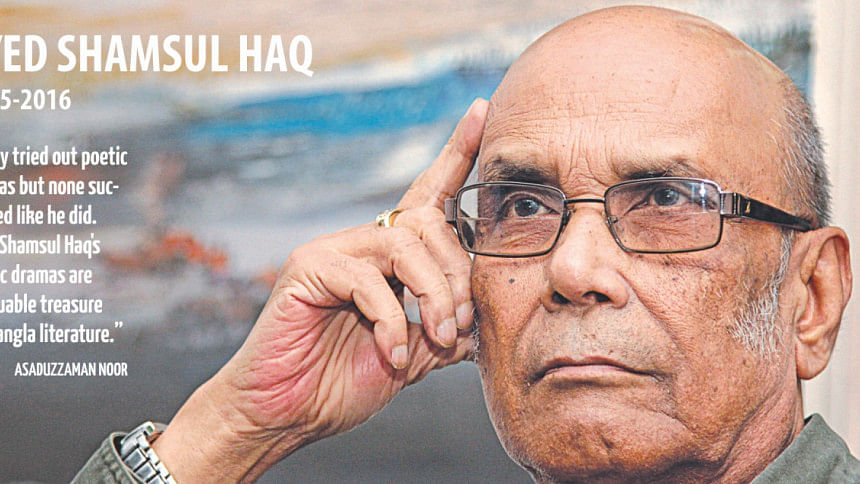
Be it verses, plays or stories - he depicted a nation's proud history with a mastery that no one else could hope to achieve in one life.
Syed Shamsul Haq, most eminent of contemporary Bangla poets, an ambidextrous writer and playwright, died at a city hospital last evening at the age of 81.
His Nuruldiner Sara Jibon (The Entire Life of Nuruldin) captured the rise of the peasants of Bengal in rebellion against the tyranny of the British Raj at around the end of eighteenth century in Rangpur, the district Haq himself was born in about 200-years later. Through the voice of an unsung leader Nurul Uddin, he uttered the magical words of uprising -- Jago Bahe, Konthe Shobai.
1971, the nation's most glorious year in modern history, reemerges as a truthful flashback each time Haq's famous play -- Payer Awaj Paoa Jay -- (We Hear the Footsteps) is staged at theatres.
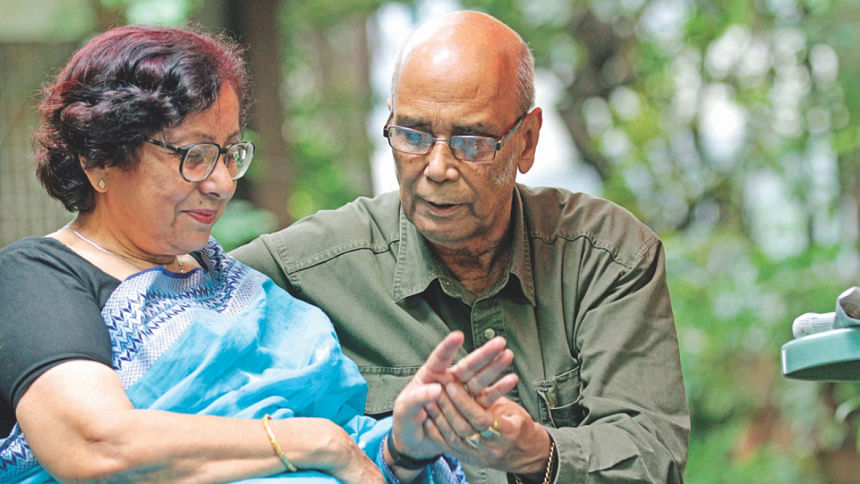
Years later, in the '90s, Haq delivered yet another of his legendary poetic creation - Amar Porichoy (My Identity). It has it all -- from the anthropological history to cultural heredities, from remote ancestry to Bangali nationhood.
In his own words, Syed Haq says about -- Amar Porichoy -- “I wrote 'Amar Porichoy' at a point when I was inspired to write a short history of Bangladesh for young readers. It was to enable them to learn the history and backdrop of our identity. Later, I changed my mind to express my feelings through the most antique form of literature -- poetry. Thus an interesting and well-received poem emerged in 1993."
"I am very happy that it gives you a patriotic passion revisiting the roots of our identity. I have tried to include the four pillars – nationalism, secularism, socialism and democracy – the essence of the Liberation War. I have tried to assimilate that through my poetic effort…say for example, excerpts like, 'Ami To Eshechhi Barendrabhum-e Sona Masjid Theke, Ami To Eshechhi Matir Deul Aaul Baul Thekey' or 'Ami To Eshechhi Zainul Ar Aban Thakur Theke, Ami To Eshechhi Geetanjali O Agniveena'r Theke' evokes that essence."
Born in Kurigram on 27 December, 1935 to father Syed Siddique Husain and mother Halima Khatun, Syed Shamsul Haq, commanded contemporary Bangla literature for over six decades as a literary giant.
Starting from Pakistan days, Haq's fountain of literary creations flowed ceaselessly for decades, inspiring hundreds of thousands of poetry lovers, and connoisseurs of literature at home and abroad.
Haq married Anwara Syed Haq. Together they were blessed with a daughter, Bidita Sadiq, and a son, Ditio Syed Haq.
Syed Shamsul Haq, popularly known as Syed Haq, wrote innumerable poetry, fiction, plays (mostly in verse), and essays. He wrote several film scripts and penned many patriotic songs of incomparable beauty. His literary works were included in the curriculum of junior school, secondary, higher secondary, and graduate level Bangla literature.
A recipient of the Bangla Academy Award (1966) and Ekushey Padak (1984), Haq had been suffering from lung cancer lately and went to the United Kingdom for treatment in April this year. He returned home on September 2 and was admitted at the United Hospital.
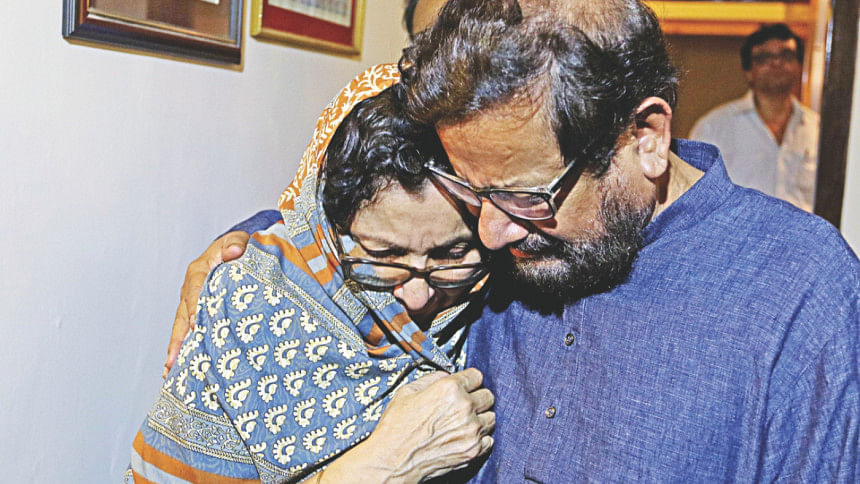
Haq has written prolifically about love and honour, pity and pride, compassion and sacrifice and peace and war. Bangla literature has not seen a polymath of his equal in ages. His work is studied at schools, colleges and universities.
Despite all the accolades Syed Haq had been quite unmoved by the fanfare. What motivated him to keep on writing? “If I don't write, I don't feel well,” he once said. “I write poetry, stories, novels, plays and essays. I do not consider them separate mediums. They all accomplish the same thing--expression through language. They all stem from the same source--language which is the only material I have, just like a painter with his colour.”
The treasure trove of Haq's literary work is very rich. His poetry collections include, among others, Ekoda Ek Rajje (Once Upon a Time in a Kingdom, 1961), Boishekhe Rochito Ponktimala (Verses of Boishakh, 1969), Birotihin Utsob (The Ceaseless Festival, 1969), Protidhonigon (The Echos, 1976), Opor Purush (The Other Man, 1978), and Kobita Samagra (Collected Poems) in 3 Volumes published in 2007.
His poems reveal a deep inspiration, and in a mysterious way appeal to the readers' own feelings and stimulate their imagination. He believes that poetry gives shape to our experience and unformulated words. It gives us wings to fly--we understand ourselves and the world a little better. Or, we get another perspective of looking at things.
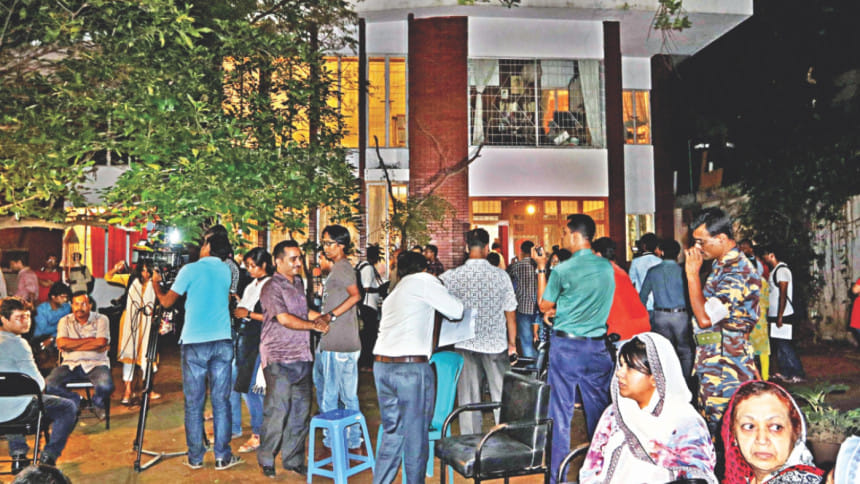
He is known for his lyrical flow of voices and counter-voices in novels and plays that force entry into oppression's closed rooms. His plays and novels about the Liberation War delve into the psychological state of the people and their inner conflicts in a war-torn country. Payer Awaj Paoa Jai (1976) which aptly articulates ignorance and misuse of religion is even more relevant today.
His plays - Payer Awaj Paoa Jay (We Hear the Footsteps), Nuruldiner Sara Jibon (The Entire Life of Nuruldin), Ekhane Ekhon (Here, now), Ganonayaka (The public hero), Eersha (Envy), Narigon (The Women), Khatta Tamasha (Bitter Jokes), Judhha ebong Judhha (War and War), and novels Neel Dangshon (The Blue Sting), Smritimedh (Massacre of Memory), Ek Mutho Janmabhumi (A Fistful of Motherland), Ayna Bibir Pala (The Ballad of Ayna Bibi), Megh O Machine (Cloud and Machine) and Khelaram Khele Ja (Play on Khelaram), among others have inspired generations.
Syed Shamsul Haq is also credited for introducing the Bangali audience to some of the great plays of world literature with his translation work, which include, among others, Shakespeare's Macbeth, Tempest, Troilus and Cresida and Ibsen's Pyr Gynt.
His Ganonayaka is adapted from Shakespeare's Julius Caesar. As the play garnered accolades from critics, Syed Haq once said, "When you are translating something in a language, it has to be like that language. When I translate Hafiz or European poetry in Bangla, it has to reflect nuances of the Bangla language so that it completely becomes Bangla poetry, instead of reflecting nuances of that country's language."
A voracious reader of linguistics and colonial history of Bengal, he used to read detective stories to let off steam when he felt his brain was clogged up with the complexity of his plots. He loved to paint when he was not writing or thinking about writing. He liked to listen to western classical music, Nazrul Geeti and Rabindra Sangeet.
He had won every major award there was in the field of literature in the country including Independence Award (2000), Ekushey Padak (1984), Bangla Academy Award (1966), Adamjee Literary Award (1969), Alakta Gold Medal (1982), Alaol Literary Award (1983), Kabitalap Award (1983), Literary Award of the Association of Women Writers, Jebunnessa-Mahbubullah Gold Medal (1985), Padabali Kabita Award (1987), Nasiruddin Gold Medal (1990), National Poetry Award (1997), National Poetry Honour (2001), and TENAS Medal (1990).
The poet's body will be taken to Channel-i premises at 10:00am today and then to Bangla Academy at 10:30am. From there it will be taken to the Central Shahid Minar at 11am for people from all walks of life to pay their last respect.
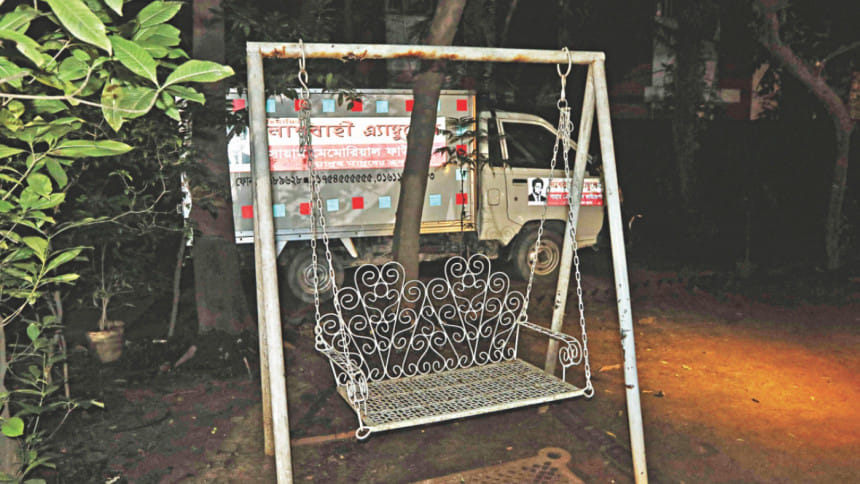
His first namaj-e-janaza will be held at the Dhaka University Central Mosque after Zohr prayers and then his body would be flown to Kurigram by a helicopter. After another namaj-e-janaza there the poet would be buried next to the Kurigram Government College as per his last wish.
CONDOLENCES POUR IN
Syed Shamsul Haq's death drew condolences from home and abroad. President Abdul Hamid, Prime Minister Sheikh Hasina, ministers, different socio-cultural and political organisations and individuals expressed condolences.
Cultural Affairs Minister Asaduzzaman Noor and many cultural activists, litterateurs, academics, students, and fans rushed to the hospital on the news of the poet's death.
In a condolence message, the president said, “Syed Shamsul Haq is a bright star of Bangla literature. His undertaking in all sections of literature will make him immortal.”
The prime minister, now in Washington, said the country lost a writer who was devoted to truth while she personally lost one of her well-wishers at his death.
“Syed Shamsul Haq viewed Bangalee, Bangladesh and Bangabandhu as inseparable entities and through his powerful writings he showed the nation the dream of a secular country,” Hasina added.
Asaduzzaman Noor was cast in some of Syed Shamsul Haq's famous plays. Noor recalled the days he used to play in Nuruldiner Sara Jibon (The Entire Life of Nuruldin). "Poetic values of Haq's plays are very significant. He was at a time popular and had been always able to connect with audience in disseminating messages, reflecting history and contemporary society through his plays."
Noor rated Haq as the most versatile literary mind in post-Tagore Bangla literature.
Opposition Leader Raushan Ershad, Jatiya Party Chairman HM Ershad, Finance Minister AMA Muhith, Education Minister Nurul Islam Nahid and Information Minister Hasanul Haq Inu expressed deep shock at Haq's death.
Talking to The Daily Star, eminent littérateur of West Bengal Shirshendu Mukhopadhyay said Haq was one of those who worked as a bridge between the two Banglas.
Poet Joy Goswami said the demise of Haq was an irreparable loss to Bangla literature.
Famed author Samaresh Majumder expressed his condolences over the poet's death.

 For all latest news, follow The Daily Star's Google News channel.
For all latest news, follow The Daily Star's Google News channel. 



Comments